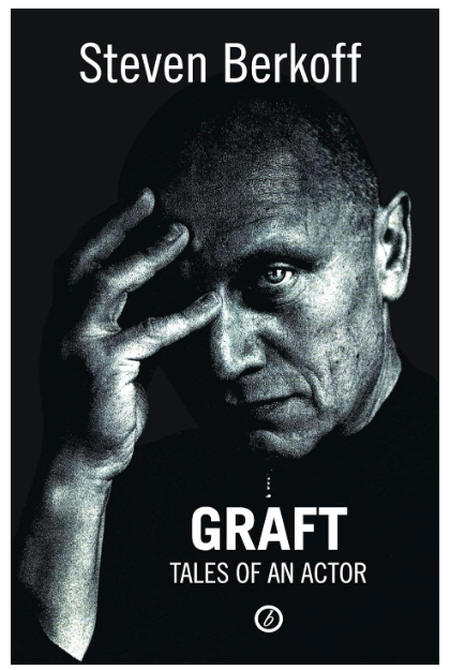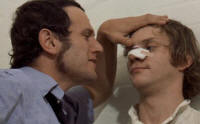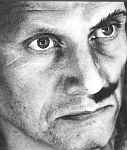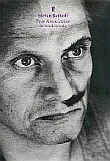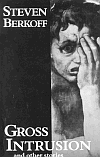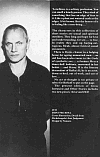|
home
advanced |
Figuring Figuration by
Deborah Knight IV Figuring the ‘Legendary Actor, Director, Playwright, Author’
4.1 Figuring the fiction of
identity Just before the narrator’s interpolation in Graft: Tales of an Actor, “Audition”, Harry surmises that Wosemawee’s beauty was ‘an aesthetic quality that could only be formed from what lay within’. He immediately juxtaposes this supposition with the following effort to describe her:
If we consider this description along with the cultural and literary references that mark the interpolation that follows it and that we looked at above, it seems quite clear that Berkoff is doing his best to mirror in his text the way we are ‘taught to express [ourselves] in stereotypes, and thus to belie the multiplicity of the libido, of the body’ (The Aesthetics of Excess 36). As the construction of my argument shows only too well, ‘the dialectical process… is a conceptual mode of appropriation, an intellectual kleptomania, recuperating all signs and events within its system’ (35). In much the same way, Berkoff’s only hope of capturing the essence that can ‘only be formed from what [lies] within’ Wosemawee and Chittle is by perversely inscribing upon their ‘parchmenty skin’ the ‘thinnish make-up’ of cultural and literary quotation, as is evinced in the references to Tennessee Williams, A Streetcar Named Desire, Alice in Wonderland, Peter Pan and Rossetti. Of course, these figures, as we have seen, can only formulate suggestive approximations that are further transformed and distorted by their reader.
When Berkoff writes that Hamlet ‘is an amalgam of all the virtues that Shakespeare himself wishes to project on to him: the great poet living in a barbaric society and wishing to heighten the consciousness of his audience’ (31), it would seem a fairly good indication that he considers Hamlet to be the Bard’s alter ego. This could lead us to reconsider the already somewhat audacious title to be, in fact, a relatively modest covering for its even bolder underlying signification of ‘I am Shakespeare’. In the following quotation from Free Association, Berkoff quite overtly draws himself into the same exclusive fraternity as Shakespeare thanks to their shared attributes of actors who not only founded their own theatre companies but also chose to write their own plays, saying: ‘writing didn’t make me feel as if I was really working and, like Shakespeare, I did it to fuel my company and create my stock’ (62). An arrogant simile perhaps, although better founded than one might imagine, for, in the history of the Edinburgh Theatre Festival, Berkoff is the most performed playwright after Shakespeare. The following passage that juxtaposes Berkoff’s youthful delight at discovering the subtexts beneath Shakespeare’s metaphorical language with his dislike of realistic theatre can only make us think of his own intensely figurative plays. Of course, he is hardly unaware of his readers’ prior knowledge that it was thanks to the richly poetic language mingling ‘street talk, rhyming slang and Yiddish expressions with Shakespearean grandiloquence’ (The Times 1977) of his first original play, East, that he made a name for himself as a playwright:
However,
whereas it is not known if Shakespeare’s
extra-thespian duties weighed heavily upon him, the
director-playwright Berkoff certainly suffers from so
often having had to relinquish his true passion for
acting (or identifying?) in order to ensure his
livelihood by directing others. In his journal, A
Prisoner in Rio (1987), Berkoff writes of his
frustration at having to give up the part of Joseph K,
with whom he had always identified, in order to direct
his adaptation of The Trial, saying ‘So I
played Titorelli as a wonderful cameo, when my whole
purpose in adapting that gargantuan labyrinth was to
express the spirit of Kafka via K’ (173).
Berkoff’s inclination for identifying with writers through their characters, as evinced in the Hamlet and Joseph K examples above, is commented on by Paul Currant in his dissertation, The Theatre of Steven Berkoff, in which he begins by alluding to a further Berkoffian identification with the hero of Kafka’s Metamorphosis before going on to speak of others:
This comment seems to indirectly forge a link with the author of the book, The Theatre and its Double (that Berkoff claims to have become his bible for a while in the sixties), of whom he speaks a few pages later:
Paul Currant goes as far as to see in this ‘paradigm of identification – of a kind of total theatre – where Usher is empathetic with Poe, Artaud, and Berkoff, Artaud with Poe, and Berkoff with Artaud and Poe’ (77) a parallel development in the artistic sensitivity of Berkoff the writer and director: ‘This may be one reason that Berkoff’s The Fall of the House of Usher, containing as it does so many subtextual relationships, provides profound and complex insights into the workings of the character’s minds’ (77). Berkoff himself takes this relatively abstract concept of the career advancing effects of artistic empathy as far as the realm of the supernatural. An anecdote in Coriolanus recounts how his presence in the office of the National Theatre ‘on the hour’ (60) Sir Laurence Olivier died resulted in his being asked to replace the cancelled production that the death incurred with his version of Oscar Wilde’s Salomé, in which he out does himself in the role of Herod. The general tone of the account clearly implies Berkoff’s superstitious feeling that the legendary actor had posthumously bestowed upon him the duty of taking up his position in British theatre where he had left off and treading the planks of the National in his footsteps. I initially saw these forced self-aggrandizing affiliations simply as crude devices for elevating and marketing his image. No doubt they are as well, but I had not seen that the term ‘self-aggrandizing’ is merely a stronger nuance of the term ‘self-constructing’. If I consider the intensity of Berkoff’s distinctive self-descriptive idiosyncrasy in the following passage from Free Association with my earlier observations on the factitiousness of his autobiographical figuration of Chittle and Wosemawee, I begin to shift my perception of these identifications from the first of the above nuances to the other:
4.2 Figuratively bound
If we use the above observations to interpret the following passage in which Berkoff does not seem quite so self-consciously aware of this figurative building of himself, the questionable taste of the name brandishing that occurs could then take on a different aspect: that of the description of a sleeping body attempting to chart its own existential identity by throwing out dream lines and reeling in the sustenance upon which to nourish the fiction of a self:
We
could of course ask what Wilde’s point was in
sending Gielgud if it was only to hear the latter talk
about himself, but that would not be very sporting of us
as it would deprive Berkoff of the occasion to show off
how very cultured and learned he is. Perhaps the true
merit of the above passage is the way in which it
indicates, to the contrary of Berkoff’s
self-accommodating conclusion, how very arbitrary our
identity-forming associations are. Georges Bataille wrote
‘it is clear that the world is purely parodic, in
other words, that each thing seen is the parody of
another, or is the same thing in deceptive form’ (Visions
of Excess 5).
Bataille goes on to give ludicrous examples of similes to demystify the magically valued combinations that traditionally determine the position of man in the midst of the elements:
And yet, are we not paradoxically bound to construct identities from equivalences and differences in order to give our existence significance? In I am Hamlet Berkoff uses the prescriptive cover of Shakespeare - another actor-friendly director such as he -, via Hamlet, to give weight to his oft-reiterated view that any actor of outstanding talent will be ostracized by the director-orientated theatre of the West Ends or Broadways of today:
Of course, that must be Berkoff lining himself up at the end of a self-appointed genealogy of greats, in an ellipsis that succeeds in combining a very British show of modesty with a very un-British sense of self-worth. Or perhaps the space between the long dash and the short is inviting us to separate the two parts of his name, thereby figuratively inciting us to think of the predisposition for ‘pleasuring the “self”’ that lies beneath the epithet such a public display of this propensity could call unbidden to others’ minds: jerk off > berk off. This interpretation would be supported not only by the time-honoured euphemistic qualities of ellipsis these two vulgarities lurk behind, but also by Berkoff’s renowned sense of self-ridicule. Which in turn would link up rather nicely with my belief in his conscientious signaling of his identity-conferring figuration.
And yet, as he walks, Harry suspects his feet are leading him not into a solution-bearing past, but to the pub of his predilection:
Although Harry had begun the walk suspecting he was ‘making a circumambulatory pattern like a criminal nervously surveying the object of his desire’ (127), the hope that ‘something would leap out of the unconscious memory that could not be triggered otherwise’ (129) turns him into feeling like ‘a detective at a crime scene, restaging all the events just as they had happened’ (129). However, towards the end of his sightseeing tour of the past, the thought occurs to him that he may not be such a talented actor as he thought he was and that rejection has not been a part of ‘some mysterious conspiracy’ (142) but based purely on what he had to offer. He asks himself if he could bear to see his image in that mirror, bear to know the truth, and not what his fantasy has shielded him from, ‘the way a perfume masks your real, essential self’ (141). But, validating that thought would show that all the sacrifices he had made of the ‘simple pleasures and sustenance of life and love and interweaving was for a chimera’ (142) and necessarily bring him to the most anxiety-ridden thought of them all: ‘who and what are you?’ (143). So he compliantly returns to the faith that his agent will call him at the very instant he ‘discovers’ he is standing in front of the pub. This walk calls to mind not only Georges Bataille’s description of copulas linking one word to the next and leading thought into its own labyrinth, but also the poststructuralist insistence that all discourse leads inexorably towards its prearranged conclusion. Hence, revisiting the past can only really be carried out by blindly clutching on to the guiding rope that is firmly attached to the safety pegs of the present. This agenda is perhaps more clearly discernible in Berkoff’s autobiography than in most because of his decision to follow the meanderings of thought and to ‘free associate,’ thereby allowing the past and the present to intermingle, instead of following the linear course of his life. For instance, although examples of the unpredictability of the meanings of words abound in Berkoff’s description of his upbringing, this seeming childhood sensitivity to the instability of language has to be read in its context as the literary rendition of an adult playwright whose reputation has been built on his richly metaphorical use of language. Let us look at the following autobiographical description of Berkoff’s early childhood in Luton, where his family was evacuated during the war. Rather than settle into the house they were allotted in order to make something of their lives, every long-term project was constantly held off with the excuse that they would eventually fulfil Berkoff’s mother’s wish of emigrating to the States. The insecurity of living ‘temporarily’ was further accentuated by the added anxiety of the war and the rumours of anti-Semite atrocities being carried out by the Nazis only a few hundred miles away. Berkoff describes his storybook conviction that England would never be invaded by the Nazis (because the English were ‘good’ and ‘good people always won’ {74}) as being more fragile than supposed when a neighbouring child commented that if Hitler should arrive in England he would immediately kill all the Jews. The bourgeoning anti-Semitism of this ‘casual’ remark was obviously not lost on him, as he was being taught at school, along with the other children, that the Jews killed Jesus Christ. The sudden realization that he could not classify himself with the ‘good’ English as he had originally assumed, but should rather consider himself to be ‘an exile or a potential devil incarnate’ (80), led him to gradually change from the ‘fairly normal, venturesome child’ he had been into ‘a ball of apprehension and doubt’ (75).
The statement that follows, ‘I doubted everything and everyone and would accept nothing unless it was proven to me’(75), seems to testify to the unsettling effect that abstract notions of identity, and the even more abstract connotations they accumulate along the way, can work upon a child’s imagination as he tries to reconcile this strange figurative world with the one originally perceived. And yet, to what extent does Berkoff’s adult understanding colour his portrayal of the effects new and unsuspected meanings of words like ‘Jew’ and ‘English’ and ‘Nazi’ and ‘murderer’ could work upon a child’s mind? Was his unusual sensitivity to the literal meaning of idioms that he uses time and again in his plays already making itself apparent in his extraordinarily strong reaction to his sister’s unthinking figurative description of the appearance of the sky, or is this a classical case of writer’s licence? He goes on to relate a particularly Kafkaesque form of trial his father put him through in order to merit the yearned for bicycle all his other friends had as a matter of course. He was finally promised it on condition that he succeed in being a model of good behaviour for forty days. It would seem the young ‘sinner’ saw therein the parallel possibility of spiritual redemption, for, recognizing ‘the biblical resonance of the injunction of forty days’ (76), he set to with a will. Going against every impulse he was ‘hormonally and genetically programmed’ (77) to obey, he was nevertheless punished for a minor infringement and made to go back to day one again. He did what he was told and waited and waited, for he saw ‘at the end of the rainbow’ (77) a shiny bicycle. However, when the designated day arrived when he was to receive his reward, his father returned home not with a bike, but with beigels. Berkoff’s only commentary about his father’s flagrant violation of his ‘word’ is to write: ‘He knew I liked beigels. Beigels I liked. But I preferred bicycles’ (80).
At any rate, Berkoff explains that the ‘short, sharp shock’ the state had dreamed up for first offenders may not have succeeded in returning him to the community ‘a chastened youth’ (143) as intended, but he did return with the centre minister’s incidental remark ringing in his ears that his beloved dancing ‘mecca’, the Lyceum, had once been a theatre. It would seem the casual observation had metaphorically presented him with a choice: either he could continue trying to escape the destiny of life as a salesman that his Jewish East End heritage had marked out for him through pursuing those idle pursuits that brought on the retribution of ‘Johnny Law’, or he could change his ‘identity’ in the hitherto entirely foreign world of the theatre. In the light of this incident and his use of his cultural background in his plays, the above quotation implies a certain common ground Berkoff sees himself as sharing with Arthur Miller, one of the few modern playwrights he admires along with Clifford Odets and Tennessee Williams, for his way of using the actor as ‘an instrument or an ally to create the “social hero”… not the wimp, not the Noël Coward neurotic narcissus, but the animal of instinct prowling the jungle of the cities’ (Free Association 113). Where do Berkoff’s lines of words and identifications lead us in his autobiography? No one but an actor such as he can be quite as aware of the borrowed nature of identity. In “Audition”, Harry revels in his newfound access to a new role, week after week, in which he can express himself:
In “Role”, Harry wonders if it is
Our Harry of the above short story “Journey” succeeds in surmounting his jealousy of the office workers he sees enjoying their evening leisure after a productive day by reciting passages to himself from Hamlet.
In the following passage in which Harry achieves a sense of superiority over the office workers, his gradual incarnation of the identity of his predilection is echoed in the text by the concluding sentence’s loss of a subject pronoun.
In the play East, Les tells Mike, after seeing a beautiful woman on the bus, that they have accustomed themselves to ‘thinking of love and sex in terms of gang bangs behind the Essoldo’ and goes on to comment ‘we get what we think we are, we give ourselves what we deserve’. When the critic Benedict Nightingale evokes this scene in order to say ‘Les’s comment passes’, but ‘clearly reflects Berkoff’s own’ (The Daily Mail, 1999), I have to agree with him. Berkoff’s entire life work seems to have been dedicated to changing the socially imposed identity his birth bestowed upon him to one that he can call his own. And possessively so, for it seems he purposely defies interpretation.
He had good reason to be cautious in the light of Berkoff’s notorious threat to murder the Guardian’s critic Nicholas de Jongh in the early eighties. Berkoff makes short work of invalidating the threat in Free Association, saying that he had been hurt by Nick de Jongh’s review of his Hamlet and felt this critic had been using him as a whipping boy for years:
In
those days of course, Berkoff was still getting mileage
out of his image of the rebellious self-made East Ender
making it good in theatre land. The above persona of the
streetwise hoodlum is a far cry from the gentleman the
Italian critic Francesco Pugliano’s perceived at the
Asti Theatre Festival twenty years later.
Was he acting there too? In the same year, Lyn Gardner writes of her meeting with Berkoff at the opening of his 25th anniversary West End production of East:
To borrow Nick de Jongh words, with an actor like Berkoff, ‘you can never really know’ (Who Keeps The Score 134) with whom you are dealing. Thirty pages or so before the end of his autobiography, Berkoff creates another implicit link between himself and a famous artist. Putting Salvodor Dalí’s famous declaration, ‘I am the greatest painterrr in the entirrrre worrrld’ (363), down to ‘the imp that fired his spirit’ (363), he goes on to say that ‘the imp is the child that all original artists keep within themselves’. Several lines further down the page ‘all original artists’ have been replaced by the personal pronoun ‘we’ in the sentence ‘we keep the child alive inside so that we can refer back to pre-adult life like pre-Ice Age’ (363). The reason for this evocation of the Surrealist artist’s legendary arrogance becomes, perhaps, more evident at the closure of the book, when Berkoff interviews himself in order to reveal the part that believes him to be ‘the answer to the twentieth century’s cry for the new’ (390).
And yet, this identity-conferring statement, this life-purpose-giving sentiment, is not the concluding sentence. The passage that validates it begins with ‘My plays are performed by the young’ and ends with ‘They are concerned to express their song, their spirit, their sex, their ideals and if some of them find these in me, then I am proud, since they are the seed that grows into the tree’ (391). If I have italicised the words ‘my plays’ and ‘me’, it is to draw attention to a similar blending of the author with his texts that we looked at in Berkoff’s identifications. In a concluding paradigm of identification that shifts Berkoff into the historical or genealogical role, ‘Berkoff’ has become the emblem for the texts that in turn constitute the metaphors the young have chosen as a means of self-expression. Berkoff’s conclusion is: ‘The young are the adults of the future. So that is what I believe and not only believe but must believe, not with arrogance or anger but because that is what the plays are to me. They are living embodiments of my life’(391). Here, it seems to me, Berkoff is both affirming a life-motivating identity and evoking its dissolution in the very posterity that will deform it.
V Figuring the Essence of the Person 5.1 The elliptical identity When Weiss states that ‘all interpretation is essentially periphrastic of silence; the body is the ultimate referent of all expression, the foundation of all sublimation; the body itself is expressed by every ellipsis’ (28), he is simply setting the elements of the paradox of figuration side by side: we cannot define the individual body except by giving it a fabricated identity made up of culturally determined allusions. Nor can we leave it to reside in the non-determinate state of ellipsis, which is the only way to grant it a true identity of its own, without immediately wishing to fill in the hole that is left with some sort of communicable meaning; as we saw when the various ellipses in the construction of Chittle in Free Association obliged me to set my interpretive forces in motion in order to make sense of them. Initially seeing them as echoing the old patriarchal refusal to give women their right to an identity of their own, I now see them as taking on a completely different and surprising signification. Rather than deprive her of her own incommunicable uniqueness, perhaps they are actually meant to mark that very individuality by refusing to confer upon her a borrowed, eclectic identity. Unfortunately, the reader fills in what the writer leaves out, as I did when I interpreted missing information with the clues at my disposal, perhaps not to my entire satisfaction, but enough to keep on reading. Although the historical Berkoff may be seen to suddenly appear in the text hand in hand with the figure of an ellipsis - Harry’s allusion to the elliptical rape scene in A Streetcar Named Desire - in his compilation of short stories Graft, it is obvious that he could not use the language-free trope of ellipsis to inscribe himself within the text when he took up his pen to write his autobiography. His only chance of alerting us to his dependence upon the ‘free associations’ he is obliged to make in order to give us a picture of himself is by bringing to our awareness the figurative similarities that run between his autobiography and his fictional short stories. If his figuration of various women has taught me to notice his own likening of himself to various famous personages, it also amuses me to see him as purposely highlighting the ellipses in their make-up in order to show up their absence from his own personal, generic figuration. This interpretation would generate a surprising reversal in the traditional signalling of the woman through the male, with the woman’s identity thereby being shown to reside in her signifying emptiness while the male is revealed as identity-less because of the over-determination of his figurative make-up. 5.2 The wordless libido
The twenty-year old Harry or Berkoff may dream, but he is a far more civilized, or repressed, animal than Stanley. His initial outburst ‘you were the first and most exquisite creature I ever saw’ seems hardly meant to be interpreted literally, but metaphorically. Running straight into ‘and seemed to materialize from Alice in Wonderland’, the second part of the sentence loses its spontaneous, joyous quality as if the underlying passion that instinctively and rather clumsily figures Wosemawee as an Eve-like creature is swiftly being sublimated by thought into producing a far more controlled evocation of a white-socked child, with all the attendant taboos of civilization that place such a creature out of immediate physical reach. Knowing that it was at about this time in his life that Berkoff spent his year at the Webber-Douglas Academy of Dramatic Art reading and talking Nietzsche with the other students ‘like budding Sartres’ (Free Association 113), we must recall Allen Weiss’s interpretation of the philosopher’s genealogical procedure as a ‘mode of desublimation, whereby intentional meanings are decomposed into their libidinal components, where linguistic unity is revealed as the pretext for the regulation of the body’ (28). He states in The Aesthetics of Excess,
As for the mysterious nameless woman Berkoff went to see in Brighton in Coriolanus, whose existence is understood via allusion rather than through concrete detail because of the elliptical information in Berkoff’s narrative concerning this weekend, perhaps her peculiar figuration is also due to a wish to conserve the wordlessness of her pre-linguistic libidinous essence. This could bring us to reconsider the possibility that there always was only one woman in Berkoff’s life at that time, by the name of Clara. Her referential reduction to the acronym ‘C’ which occasional lapses either into her full name or complete namelessness could then simply be Berkoff’s figurative method of signaling her changing position within his psyche: from the intermediate state of a conscious and possessive refusal to linguistically share her identity with us, to her sudden condition of acquiring a full name when he is considering her intellectually, or to her converse condition of namelessness when she disappears into the wordlessness of his libido. A common pictorial trait runs between Berkoff’s autobiography and his two volumes of short stories, consolidating the self-fashioning theme we have already seen to link them. Each book shows two sides to Berkoff’s face in very particular ways.
The design has clearly been conceived to show the historical Berkoff as lying directly beneath the black and white reproduction of the Italian artist’s painting. Whereas Berkoff holds his hands behind his back and looks calmly out at us, the extremely anguished-looking male figure in the painting entirely covers one side of his face with a hand, thereby thematically linking the book to the other two above. However, the fact that Berkoff himself is no longer to be found on the front cover, but hidden behind, implies a further layering, or deepening, of the ‘multi-faceted’ motif he has developed around his ‘identity’. This time the allusion to the Last Judgement brings a religious or moral dimension into the picture, which in turn is supported by Berkoff’s description of each tale in this volume as being a form of ‘secret confession’ (192), that he had written in about an hour, ‘in one huge explosion, without stopping for breath’ (192), by taking as his departure point the first line that popped into his head. The effort to escape the censoring effects of conditioned morality seems evident in the following words: ‘What ever surfaced in my mind, from out of the murky depths, would be my headline. Each story in an unconscious way seemed to extirpate some knot of bitterness and gall’ (192). Having taken Hubert Selby Junior’s Last Exit to Brooklyn and Tennessee Williams story called “Desire and the Black Masseur” as inspiration to see things in a more ‘candid and raw fashion’ (192), Berkoff considers each of his resulting short stories to be ‘a secret confession, even if the guilts were only imagined and never acted out’ (192). In “Daddy”, Berkoff’s story about a young man who only recognizes his father through the swirling steam of the public baths at the very moment the latter is about to perform fellatio on him brings to mind some of the details of his autobiographical account of one of his own father’s perennial lies to his mother: Although Berkoff senior would often tell his wife he would sleep over at the Imperial Turkish Baths in Russell Square so that he could chat to his pals, his son never saw him when he would go there as a young man after dancing all night at the Imperial, even though he would see plenty of other ‘fat old men…[eyeing] the youths’ (Free Association 140). Although a passage such as the following description of the protagonist,
calls to mind the author’s own carefully publicized image of himself as a ladies’ man, I think the true autobiographical merit of this story lies not in the similarities that run between it and Berkoff’s life, but in its far more pertinent metaphorical evocation of the difficulty inherent in expressing oneself, and not the Other, through language. For instance, when Cyril attempts to escape from his socially imposed heterosexual identity by attending to the empirical dictates of his body, he is obliged to resort to the wordless anonymity of the Turkish baths that he is in the habit of visiting to follow his sexual inclinations, for it is ‘as if sewn into his unconscious that male desire and furtiveness [are] immutable’ (35). There, he enjoys the way in which he is ‘depersonalised’ into ‘mere hard warm pliant flesh’ (33) by the men ‘of a feather’ (33) whose identities remain obscured by the steam:
Occasionally, despite himself, his thoughts turn to his ‘upright, righteous father’ (36) who is a prison warden and before whom he feels the guilt of his clandestine desires must
It is ironic that, when he suddenly recognizes his law-enforcing father’s balding head lowering itself onto ‘him’ and the ‘reality’ of the heterosexual outside world he was attempting to escape comes rushing back with all the appearance of a ‘dream’, it is he who restores the status quo by rushing out:
In a paradoxical reversal of roles, the story’s denouement places Cyril in the position of law-enforcer and the father in that of the ‘stranger’ as the incest taboo rushes in to pick up where the homosexual taboo had temporarily left off and the tyrannical demands of filial discourse exert themselves over the sexual morality of the parent:
© Deborah Knight 2001 |


